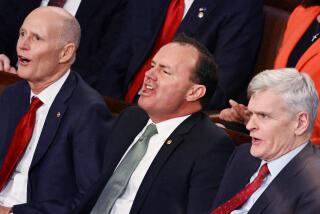GOP Said to Scrap Plan That Gives Retirees Health Benefits : Reform: House Medicare proposal would have had government subsidize firms. But businesses feared voluntary program might in time become mandatory.
- Share via
WASHINGTON — Facing strong complaints from the business community, House Republican leaders reportedly have dropped a plan that would permit workers to remain in their company health plans after they turn 65, using Medicare allowances to pay for it.
Businesses feared that a future Congress might convert a voluntary, government-subsidized program into a mandatory one in which employers would have to foot the bill.
“We have expressed serious concerns about it,” R. Bruce Josten, director of member policy for the U.S. Chamber of Commerce, said Tuesday. “There is a fear that future Congresses would make it mandatory. There is no guarantee that the government would keep pace with health care inflation in making reimbursements to business,” he said.
The controversial provision “seems to be knocked out” in the Medicare plan under development by House Republicans, said James Klein, head of the Assn. of Private Pension and Welfare Plans, a major employer trade group.
The idea was called “seamless coverage.” Workers 65 and older enrolled in a corporate health plan would be permitted to stay in that plan after retiring. The federal government, calculating what it would spend for an average Medicare beneficiary, would give that amount to the business for each worker who remained under corporate coverage.
But if there were a federal financial crisis, the government might cut back the size of its annual payment, forcing a new financial burden on the corporations to cover the cost of medical care for the retirees, Klein said.
“Considerable activity” by the business community has persuaded the House leaders to drop the idea, he noted.
Originally, GOP planners had expected to include the choice of staying with a company plan as one of the options Medicare beneficiaries could choose each year. That option would be one selection along with a lengthy list of government-approved health maintenance organizations and other health networks.
Instead, the House bill is likely to include a much weaker version, allowing some trade associations or business groups to offer a Medicare-type plan. And some industries, such as construction, which have industry-wide health plans operated jointly by management and unions, also could voluntarily adapt these programs for those of retirement age as an alternative to Medicare.
But there would be nothing in the bill offering this type of plan for individual corporations.
Meanwhile, Republican health planners in both houses of Congress were rushing to assemble their detailed Medicare reform blueprints. Their goal is to reduce future spending by $270 billion over seven years, to help balance the federal budget and to avert bankruptcy of Medicare’s hospital trust fund, which is expected to run out of money in 2002.
The detailed House proposal may be unveiled on Friday, with the Senate blueprint expected next week.
More to Read
Get the L.A. Times Politics newsletter
Deeply reported insights into legislation, politics and policy from Sacramento, Washington and beyond. In your inbox twice per week.
You may occasionally receive promotional content from the Los Angeles Times.










